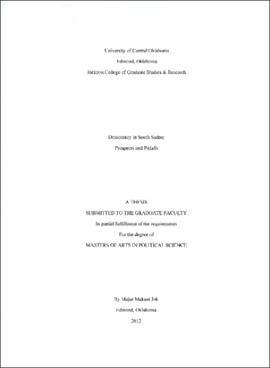| dc.contributor.advisor | Furmanski, Louis S. | |
| dc.contributor.author | Jok, Majur Makuei | |
| dc.date.accessioned | 2020-05-26T20:39:10Z | |
| dc.date.available | 2020-05-26T20:39:10Z | |
| dc.date.issued | 2012 | |
| dc.identifier.other | (AlmaMMSId)9978442385202196 | |
| dc.identifier.uri | https://hdl.handle.net/11244/324702 | |
| dc.description.abstract | Democracy in one among many other things in the nation building package that the South Sudan government is looking to achieve. Where or what are the hopes? what is it that will work this rime around?. Almost all African countries have gone down this path of democracy and democratization following their independence but the path has proven to be difficult, problematic, and chaotic on many occassions. How will South Sudan quest for democracy and democratization come out different in the real politick of Africa? The argument in this thesis is not questioning the decision by the South Sudan. The author strongly believed that it is a right thing and a good move by the government of South Sudan (GOSS) to make South Sudan a democracy. The Sudan Peoples' Liberation Movement/ Sudan Peoples; Liberation Army fought for this very reason- the lack of democracy in the Sudan. Where concern arises is our understanding of the history of democracy and democratization in Africa as a whole. This history of democratic transition by African states has not been a good one but one that is a complete disappointment. We have seen African countries adopt democratic reforms, democratize or not forge democracy at all. Even if some manage to achieve democracy, the problem is that they do not last long but offen die at young age before even reaching one annual democratic cycle or two. What is it that will make a difference for South Sudan to succeed against these odds? This thesis is a comparative case study using three liberation movements: National Resistance Movement (NRM) in Uganda; Tigray People''s lIberation Front (TPLF) in Ethiopia; and Eritrea People's Liberation Front (EPLF) in Eritrea. All three movements went into power with the message of democracy but have since then reverersed course on their promises to establish democracy in their respective countries. It is very clear in today's political realities to say that what the future holds for democracy in these countries is any one own guess, as long they remained governed by the same presidents and their parties. I have organized the thesis as follows: i will open it with an introduction on the historical background on the history that led to the independent of the South Sudan from the old Sudan. What follows next is chapter two where I will discuss the academic literature on democracy and democratization in Africa. I provide case studies analysis in chapter three. in chapter four, I will present some of the lessons that South Sudan will draw from the three case studies analysis. I will conclude with some suggestions and possible alternatives that may help South Sudan transition to multi-party democracy.--Abstract. | |
| dc.rights | All rights reserved by the author, who has granted UCO Chambers Library the non-exclusive right to share this material in its online repositories. Contact UCO Chambers Library's Digital Initiatives Working Group at diwg@uco.edu for the permission policy on the use, reproduction or distribution of this material. | |
| dc.subject.lcsh | Democratization | |
| dc.subject.lcsh | National liberation movements | |
| dc.title | Democracy in South Sudan : prospects and pitfalls. | |
| dc.type | Academic theses | |
| dc.contributor.committeeMember | Gatch, Loren, | |
| dc.contributor.committeeMember | Hardt, Jan | |
| dc.thesis.degree | M.A., Political Science | |
| dc.identifier.oclc | (OCoLC)ocn835656568 | |
| uco.group | UCO - Graduate Works and Theses::UCO - Theses | |
| thesis.degree.grantor | Jackson College of Graduate Studies | |
